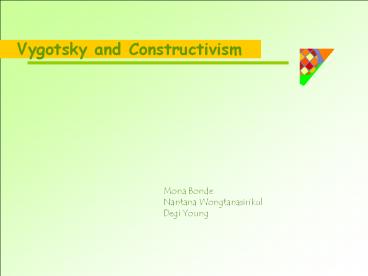Vygotsky and Constructivism - PowerPoint PPT Presentation
Title: Vygotsky and Constructivism
1
Vygotsky and Constructivism
Mona Bonde Nantana Wongtanasirikul Degi Young
2
Vygotsky and Constructivism
- Constructivist Theory
- learning is considered to be the active creation
of knowledge structures from personal experience.
- Vygotsky
- Our personal experiences are based on our social
cultural history and our interaction within that
culture.
3
Vygotsky and Constructivism
The zone of proximal development is an
underlying method of instruction in both
theories. In the zone of proximal development,
the child is able to perform tasks with
assistance from a more knowledgeable person, this
can be an instructor or a peer.
4
Vygotsky and Constructivism
Instructional Implications Critical thinking
Allows the students to experience what they
learn, this method can prove to be more effective
if done within the students social environment.
5
Vygotsky and Constructivism
- The instructor must
- Be aware of the social culture
- Know more than the student
- Reduce the guidance given to the student
- Allow students to work in groups
- Motivate the students to find a solution to
problems - Incorporate tasks that inspire active
experimentation or peer to peer interaction - Allow students to ask questions and consider
their questions and interests of value. - Ask open ended questions
6
Vygotsky and Constructivism
7
Vygotsky and Constructivism
- Terminal Objective
- To prepare students to participate in the annual
Fruit Tasting Festival in Thailand - Enabling Objective
- The student will be able to identify a particular
Thai fruit. - The student will be able to determine whether or
not the fruit is ready to eat. - The student will be able to bargain in a
culturally accepted manner with the fruit vendor.
- The student will be able to prepare and eat the
fruit in a culturally conventional manner.
8
Vygotsky and Constructivism































